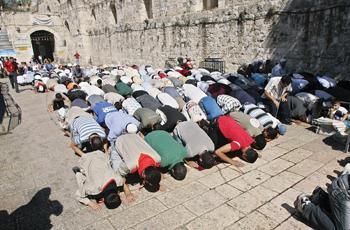“O you who believe, fasting is prescribed for you, as it was prescribed for those before you, that you may become al-Mutaqoon, [the pious],” says the holy Quran, 2:183.
We are fast approaching the end of the blessed month of Ramadan. Every year it serves as a month of training. In fact, what’s interesting is that the Arabic word for fasting, sawm, which is used by Allah in the Quran, originated when Arab bedouins would train their horses for battle in the desert. Naturally, they couldn’t take camels into battle, and likewise, horses would die without food and water if they didn’t have proper training. So sawm is to restrain.
In Ramadan Muslims fast from sun up to sun down, restraining from any drinking, eating and – for married couples – intimate relations for a whole month, the ninth month of the lunar calendar. Likewise, Muslims must talk with only the best of speech, not get angry and try to do as many good deeds as possible during this month. Many non-Muslims come up to me and tell me “that must be really hard!” However, there is certain sweetness when you do something purely for the sake of Allah, God, alone no matter how hard it is.
Fasting is training in that the way we are during Ramadan – doing extra good deeds and having the best of manners – is how we should act all year around.
It is not like the other pillars of Islam – which include praying, compulsory charity and pilgrimage – because Allah tells us in the Quran that “All the deeds of the son of Adam are for him, except for fasting, for it is for me and I shall reward for it.”
Why? Because fasting is an act of worship and only God knows which of us is really fasting. It is not a deed that can be shown off to others, which is forbidden in Islam.
Fasting was prescribed to those before us like the virgin Mary. After she gave birth to the prophet Jesus, she vowed to fast by not speaking for three days. Instead, when the people asked her about her child, she pointed to him and he spoke from the cradle.
Almost all Muslims look forward to this blessed month. It’s a time of getting closer to our creator.
I find that it is more difficult here in the United States because Muslim countries adapt to the lifestyle of Ramadan. For instance, the schools there get out early during Ramadan, and there are fewer tests. Here, our schedules are the same during the day and we also have to accommodate our acts of worship, such as reading the whole Quran from beginning to end during this month, doing extra prayers, etc. But in a way I find it much more rewarding this way because the harder we try to do our good deeds, the more reward we get for doing it, as we believe Allah is very merciful. The reasoning behind why fasting was prescribed in Ramadan is because Allah says in the Quran this is the month in which the holy Quran was revealed.
A scholar named Muhammad Saleh al-Munajjid said the reasons why fasting was prescribed are many, but one should note that of Allah’s names is Al-Hakeem – the most wise. So we may derive some of the reasons, but we should know that Allah knows best why Muslims are prescribed to do certain acts of worship. Fasting is a means that makes us appreciate and give thanks for pleasures. By giving up some of the best of pleasures -eating, drinking and intercourse – for a short time, one begins to appreciate their value. The blessings of Allah are not recognized properly except when you abstain from them. So you begin to recognize them, and this motivates you to be grateful for them.
Another reason behind fasting is that fasting is a way to learn how to give up forbidden things. Because if people can give up permissible things in order to please Allah, then they will be more likely to refrain from forbidden things.
Also, fasting makes us feel compassion and empathy toward the poor. Because when the fasting person tastes the pain of hunger for a while, he remembers those who are in this situation all the time, and he will hasten to do acts of kindness and show compassion toward them.
It is important to learn and study at least the pillars of Islam in order to get a better picture of what Islam entails. What I love about Islam is that it in itself is a treasure. But not just any treasure! It is a treasure that, when shared with others, it is not diminished in the least. But, rather, it only increases the reward.
—–Contact Shirien Elamawy at selamawy@lsureveille.com
Ramadan fasting increase faith
October 15, 2006

Muslims pray at the Lion’s Gate during Ramadan Friday prayers outside the Al Aqsa Mosque in Jerusalem’s Old City on Friday. Hundreds of Palestinians rioted and clashed with Israeli forces at checkpoints around Jerusalem on Friday after authorities blocked them from entering the city to mark the Ramadan holy month at Islam’s third-holiest site.



